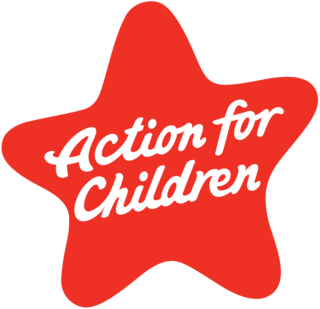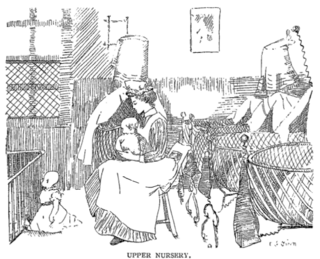
Child care, otherwise known as day care, is the care and supervision of a child or multiple children at a time, whose ages range from two weeks of age to 18 years. Although most parents spend a significant amount of time caring for their child(ren), child care typically refers to the care provided by caregivers that are not the child's parents. Child care is a broad topic that covers a wide spectrum of professionals, institutions, contexts, activities, and social and cultural conventions. Early child care is an important and often overlooked component of child development.

A preschool, also known as nursery school, pre-primary school, play school or creche, is an educational establishment or learning space offering early childhood education to children before they begin compulsory education at primary school. It may be publicly or privately operated, and may be subsidized from public funds.

Action for Children is a UK children's charity created to help vulnerable children and young people and their families in the UK. The charity has 7,000 staff and volunteers who operate over 475 services in the UK. They served a total of 671,275 children in 2021 and 2022. Action for Children's national headquarters is in Watford, and it is a registered charity under English and Scottish law. In 2017/2018, it had a gross income of £151 million.

A charitable organization or charity is an organization whose primary objectives are philanthropy and social well-being.
Social security in Sweden is an aspect of the Swedish welfare system and consists of various social insurances handled by the National Agency for Social Insurance, and welfare provided based on need by local municipalities. Social security is the main conduit for redistribution of approximately 48% of the Swedish GDP in the form of taxed income.
Sure Start is a UK Government area-based initiative, announced in 1998 by the then Chancellor of the Exchequer, Gordon Brown, applying primarily in England with slightly different versions in Wales, Scotland and Northern Ireland. The initiative originated from HM Treasury, with the aim of "giving children the best possible start in life" through improvement of childcare, early education, health and family support, with an emphasis on outreach and community development.
Playcentre is an early childhood education and parenting organisation which operates cooperative parent-led early childhood education centres throughout New Zealand. While the concept originated in New Zealand, it is now also established in Japan.
The Pre-school Learning Alliance (PLA) is an early-years educational registered charity and a voluntary sector provider of childcare for young children in England.
Child and family services (CFS) is a government or non-profit organisation designed to better the well being of individuals who come from unfortunate situations, environmental or biological. People who seek or are sought after to participate in these homes have no other resource to turn to. Children might come from abusive or neglectful homes, or live in very poor and dangerous communities. There are also agencies that cater to people who have biological deficiencies. Families that are trying to live in stable lives come to non-profit organisations for hope of a better future. Child and family services cater to many different types of people who are all in different situations. These services might be mandated through the courts via a governmental child protection agency or they might be voluntary. Child and family services may be mandated if:
St. Vincent's Day Care Center is a nonprofit daycare agency in Evansville, Indiana under the sponsorship of the Daughters of Charity of St. Vincent de Paul.
The Secret Garden is an outdoor nursery school in Letham, Fife, Scotland, for children aged 3–7 years. It is a forest kindergarten in which children walk to a woodland every day, in almost any weather. They use the natural resources they find there rather than modern toys to learn according to the government educational framework under the heading "Nature as Teacher".
Bright from the Start, also known as Georgia Department of Early Care and Learning, was established on July 1, 2004. The main office is located in downtown Atlanta, Georgia. The department licenses and monitors daycare centers and all state funded pre-k. Bright from the Start is headed by one commissioner and by a board of administrators. Bright from the Start provides children with quality preschool knowledge that will be necessary for their future school achievements. They want to offer a system of professional development for the providers and for the staff.

Professional Association for Childcare and Early Years (PACEY) is a charity and membership organisation based in London and working in England and Wales. A standard-setting organisation, it promotes best practice and support childcare professionals to deliver high standards of care and learning.

Child care in the United Kingdom is supported by a combination of rights at work, public sector provision and private companies. Child care is usually undertaken by the parents, and more often the mother who takes leave from employment. Early childhood education in a crèche or nursery is not freely available from the public sector, while fee-paying pre-schools are.
Early Years – the organisation for young children is a non-profit organisation based in Belfast, Northern Ireland. Formerly known as Nippa, it works to promote education and care services for young children. It provides support in the form of information and training to parents, childcare providers, employers and local authorities, as well as the development of programmes and projects to enhance the care and education provided for children.
The Family and Parenting Institute is an independent charity that exists to make the UK a better place for families and children. It works with charities, businesses, and public services to offer practical help to families. Its campaigns and research work focus on building a "family friendly" society by offering insights into current and future family life. It runs the Family Friendly scheme, which aims to help public and private organisations to better understand diverse families and meet their needs. The Family and Parenting Institute merged with the Daycare Trust in January 2013 and is now called the Family and Childcare Trust.
The National Children’s Centre (NCC) renamed the Yorkshire Children's Centre in 2013 to better reflect its scope, is a child-care centre which was founded in Huddersfield, West Yorkshire, England in 1975 by the National Educational Research and Development Trust (NERDT). Brian Jackson, co-author with Dennis Marsden of Education and the Working Classes, founded the trust. NCC remains the centre's legal name.
Marriage legislation has a long tradition in the Netherlands. The minimum age at marriage was set in the 1811 Civil Code, amended in 1838. Same sex marriage was allowed in 2001. The first Family Allowance Act was introduced in 1941, and provided benefits only to working families with more than two children. In 1947, the income dependency was abolished and wage earners were also entitled to an allowance for their first and second children under 18 years old. In 1963, family allowances were extended to self-employed people. Currently, all families living in the Netherlands are entitled to a family allowance if their child is younger than 18 years old. In 1956, the Netherlands passed the Nursery Education Act that funded preschool; however, in 1981, preschool was added to the standard education system. The Childcare Act of 2005 gave childcare an official framework which provided funding and supervision for many programs.

Family policy in the country of Japan refers to government measures that attempt to increase the national birthrate in order to address Japan's declining population. It is speculated that leading causes of Japan's declining birthrate include the institutional and social challenges Japanese women face when expected to care for children while simultaneously working the long hours expected of Japanese workers. Japanese family policy measures therefore seek to make childcare easier for new parents.
The Family and Childcare Trust is a UK charity formed from the merger of the Daycare Trust and the Family and Parenting Institute in 2013.






